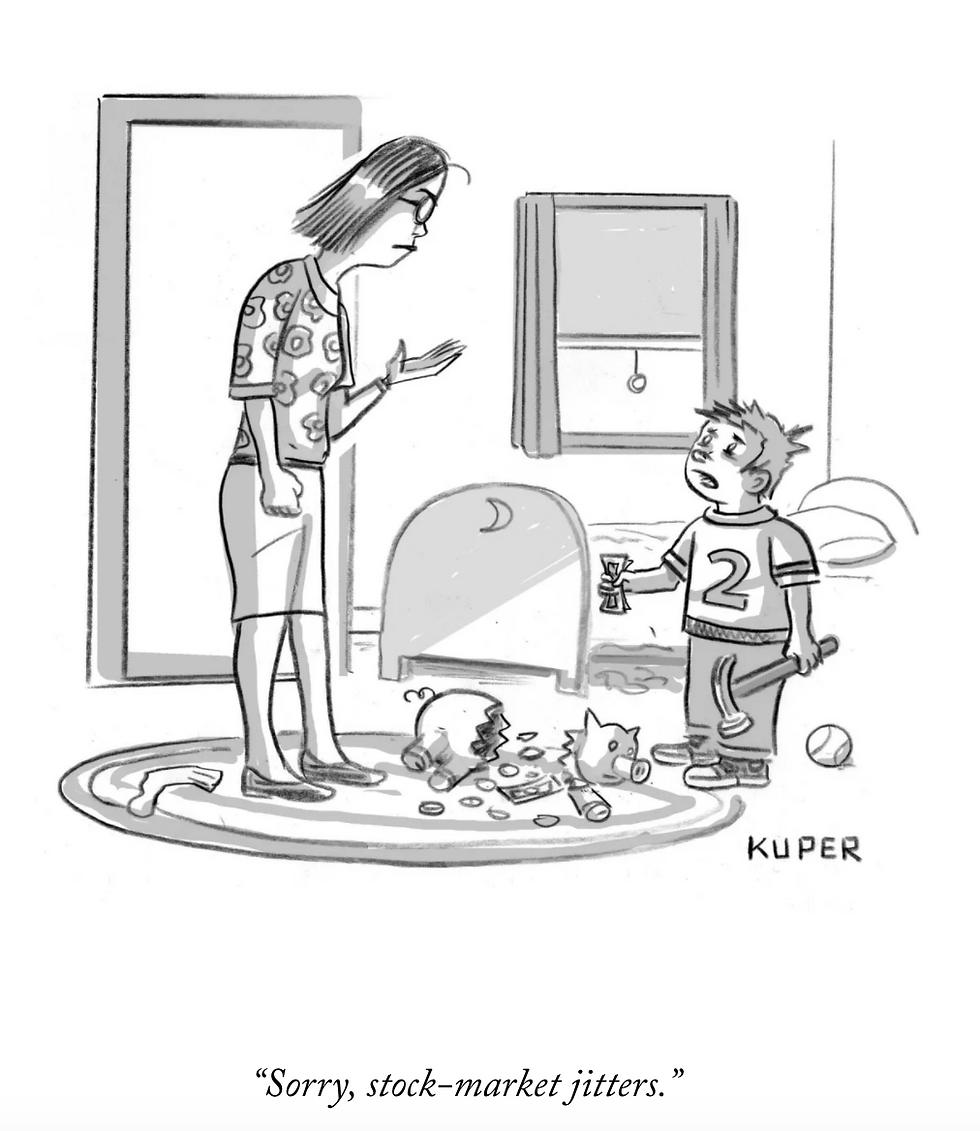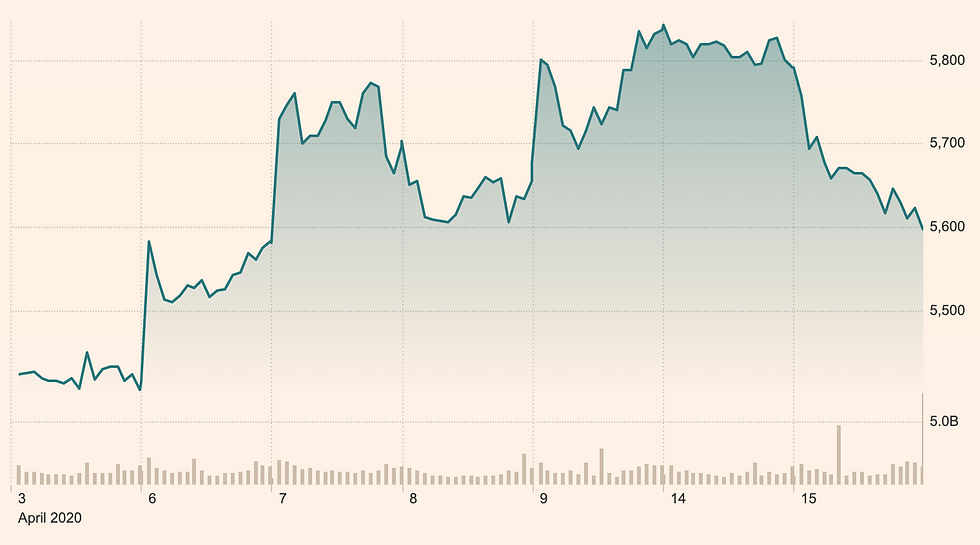- Charlotte Street Partners

- Apr 16, 2020
- 5 min read
A shark called Katharine
Written by Katie Stanton, Senior Associate
Edited by Harriet Mill, Creative Director
Good morning,
For years, my dad has tracked a shark called Katharine on an app on his phone. Katharine is my name, so I suppose he feels some affinity or connection with the seafaring moniker thief.
We’re not super similar, the shark and me. We both quite like the sea, we’re both great and, coincidentally, white. The similarities end there, mostly because she’s a shark.
The whole thing is very mundane, my dad flitted between caring and not for a few years and then stopped bringing her up and we went on.
Then, yesterday, up pops Katharine – literally. My long-lost alter-ego of the sea, my brave silky girl, bigger and better than ever had resurfaced, having ghosted her trackers for over a year. Classic Katharine, elusive little minx, much like her human counterpart. (I wish, I’m actually pretty needy).
Anyway, my point. I happened upon this news in The Times and was immediately obsessed. Katharine was originally captured as a juvenile in 2013. Clocking in at a stonking 164 stone, she patrolled the full length of the eastern United States, regularly visiting far flung locales; Bermuda, the Gulf of Mexico, Newfoundland, the list goes on. There’s a certain romance to her travels.
And she gathered a huge following, not just my weird dad. Her Twitter account has more than 61,000 followers and describes her as a “misunderstood but sassy girl just tryin’ to get some fish”. Aside from the great chat, she has actually helped a huge number of people understand more about shark’s lives and habits.
Tangential micro-interests, like this one, fascinate me. My sister does something similar, religiously tracking planes from her phone as a way of placating her crippling fear of them. My boyfriend is now obsessed with star formations, thanks to the Sky Guide app. And I spend most of my time on Rightmove looking at property I can never hope to buy.
It’s easy to feel overwhelmed by negative news at the moment. These brief, precious moments of release have amassed a new significance, distracting us from the days that stretch out ahead, and making us feel like there is something else– a sea, a sky, a freedom.
We have technology to thank for this, and a shark called Katharine.
News
Ministers are later expected to announce a three-week extension to the coronavirus lockdown. Dominic Raab, the foreign secretary, will lead emergency Cobra committee and cabinet meetings about the continuation of social distancing measures.
Meanwhile, Britain is reaching the peak of the coronavirus pandemic and will be able to finalise its strategy for easing the lockdown within ten days, according to the chief medical officer. Chris Whitty said health officials believed that the trend in new infections was beginning to “flatten out” as the death toll stayed below 800 for the fourth consecutive day. (£)
A 99-year-old war veteran who has raised more than £11m for the NHS by walking around his garden says he will keep going as long as people continue to donate. Captain Tom Moore, who turns 100 at the end of the month, has smashed his original £1,000 target by walking 100 lengths of his Bedfordshire garden.
Business and economy
The International Monetary Fund (IMF) used its half-yearly fiscal monitor to stress that “unprecedented” government spending to tackle coronavirus and its economic impact will send deficits past their post-financial crisis levels and cause debt levels to balloon. Backing the funding support, the IMF warned that spending must continue as economies recover and highlighted the importance of accountability and transparency in a clear warning against corruption.
The IMF also announced that economies in Asia will see zero growth this year for the first time in 60 years. Asia’s service sector in particular will struggle to rebound, it said, and airlines, factories, shops and restaurants have been among the hardest hit by national lockdowns.
Ships, pipelines and storage tanks holding surplus oil could be “overwhelmed” within weeks as the coronavirus pandemic causes unprecedented drops in usage, the International Energy Agency warned yesterday. (£)
Columns of note
Writing in The Guardian, Evgeny Morozov argues that the optimists predicting an end to capitalism as we know it are wrong. Instead, we are set to enter a period of “solutionism”; a series of digital plasters to cover the damage of an underfunded system. After all, “why would a government invest in rebuilding crumbling public transport systems” when it could use big data to craft personalised incentives to discourage passengers from travel at peak times?
“The past few weeks have exposed just how much a person’s risk of infection hinges on class” in America. So says Olga Khazan in The Atlantic. Low income workers are forced to get close, so that the rich can socially distance. Then come the other issues: lack of access to medical care, and disproportionately high levels of long-term, underlying health conditions. But, historically, plagues have been good for workers. Collective anger can produce lasting social change. So, when all of this is over, will the same thing happen in the US? (£)

Source: New Yorker
Markets
What happened yesterday?
London’s benchmark index fell 3.34% yesterday, while the FTSE 250 dropped 4.57% as warnings from the IMF increased caution among investors. The update was in stark contrast to the forecast issued three months ago, which projected worldwide growth of 3.3%.
Meanwhile, results from Wall Street banks rolled in:
Goldman Sachs’ first-quarter results were dragged down by provisions for losses on loans to its investment bank clients, proving it’s not immune to the credit woes of America’s main street lenders. The Wall Street bank reported net earnings of $1.2bn for the quarter ended in March, down 46% year-on-year but outpacing analyst expectations.
The Bank of America has posted a 45% decline in first-quarter profit, again having set aside loan-loss reserves. Lower interest rates will weigh on the bank’s net interest income, one of the main drivers of a lender’s revenue.
Citigroup reported a sharp drop in first-quarter profits yesterday as the bank built its loan-loss reserves to cushion the blow from the coronavirus outbreak on its business. Net income was down 46% from the previous year, although revenue was up 12% due to high fixed-income and equity trading.
Plumbing and heating group Ferguson announced that they will keep their primary listing in London and seek a secondary listing in the United States, after consulting with shareholders.
What's happening today?
Finals
Learning Tech.
Trading Announcements
Hays
Norcros
Rentokil Initl.
AGMs
Amino Tech
Chenavari
China New
Global Ports S
Verona Pharma
UK Economic Announcements
(00:01) Retail Sales
Int. Economic Announcements
(07:00) Consumer Price Index (GER)
(10:00) Industrial Production (EU)
(13:30) Philadelphia Fed Index (US)
(13:30) Building Permits (US)
(13:30) Initial Jobless Claims (US)
(13:30) Housing Starts (US)
(13:30) Continuing Claims (US)

Source: FTSE 100, Financial Times
Did you know?
Whale sharks have had their ages calculated accurately by measuring the radiation in their vertebrae left over from 1950s nuclear tests.
Parliamentary highlights
House of Commons
No business scheduled
House of Lords
No business scheduled
Scottish Parliament
No business scheduled

Comments